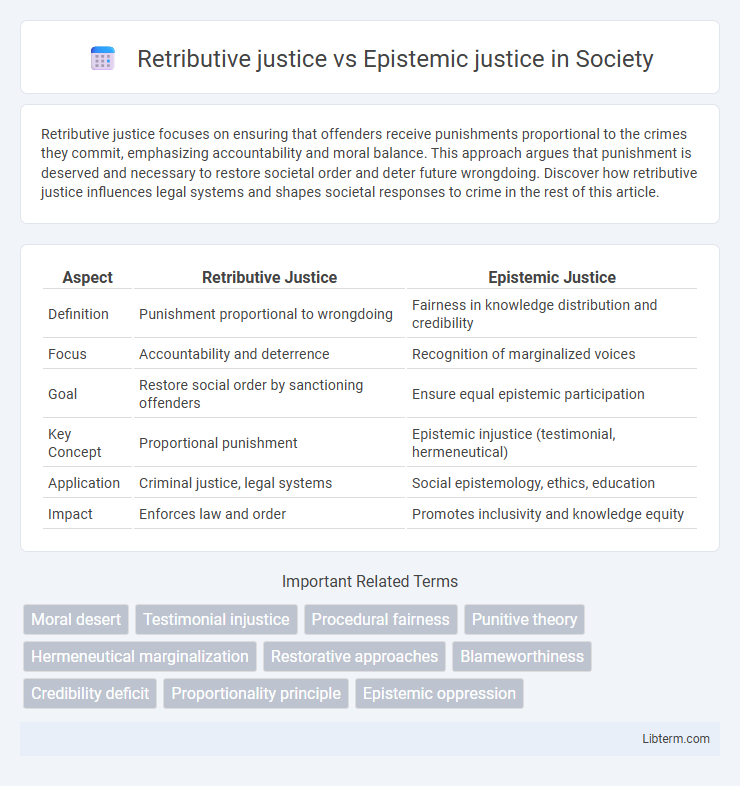Retributive justice focuses on ensuring that offenders receive punishments proportional to the crimes they commit, emphasizing accountability and moral balance. This approach argues that punishment is deserved and necessary to restore societal order and deter future wrongdoing. Discover how retributive justice influences legal systems and shapes societal responses to crime in the rest of this article.
Table of Comparison
| Aspect | Retributive Justice | Epistemic Justice |
|---|---|---|
| Definition | Punishment proportional to wrongdoing | Fairness in knowledge distribution and credibility |
| Focus | Accountability and deterrence | Recognition of marginalized voices |
| Goal | Restore social order by sanctioning offenders | Ensure equal epistemic participation |
| Key Concept | Proportional punishment | Epistemic injustice (testimonial, hermeneutical) |
| Application | Criminal justice, legal systems | Social epistemology, ethics, education |
| Impact | Enforces law and order | Promotes inclusivity and knowledge equity |
Introduction to Retributive and Epistemic Justice
Retributive justice centers on the fair punishment of wrongdoing, emphasizing accountability and proportionality in response to offenses. Epistemic justice focuses on fairness in knowledge practices, addressing the injustice experienced when individuals or groups are wronged in their capacity as knowers. These concepts highlight divergent approaches to justice, one rooted in moral responsibility and the other in equitable recognition of epistemic contributions.
Defining Retributive Justice
Retributive justice centers on the principle of proportionate punishment, where offenders receive penalties commensurate with the harm caused by their actions, emphasizing moral accountability and societal deterrence. It is grounded in the idea that justice is served when wrongdoers suffer consequences equivalent to their offenses, reinforcing legal and ethical norms. This framework contrasts with epistemic justice, which prioritizes fairness in knowledge production and recognition rather than punishment.
Defining Epistemic Justice
Epistemic justice involves recognizing and addressing injustices related to knowledge production, distribution, and credibility, ensuring marginalized voices are heard and valued. Unlike retributive justice, which focuses on punishment for wrongdoing, epistemic justice emphasizes fairness in epistemic practices, including testimonial and hermeneutical justice. This concept highlights the importance of correcting power imbalances that distort knowledge and understanding in social interactions.
Historical Contexts of Both Justice Systems
Retributive justice, rooted in ancient legal traditions, emphasizes punishment proportional to the offense to restore social order, with origins traced back to Hammurabi's Code and later codified in Roman law. Epistemic justice emerges from contemporary philosophical discourse, addressing injustices related to knowledge production and recognition, particularly within marginalized communities historically excluded from dominant narratives. These divergent justice systems reflect evolving societal priorities: retributive justice centers on accountability and deterrence, while epistemic justice seeks to rectify knowledge-based inequalities shaped by historical context.
Key Philosophical Foundations
Retributive justice is grounded in the principle of moral accountability, emphasizing proportional punishment as a response to wrongdoing, rooted in Kantian ethics and desert-based theories. Epistemic justice centers on fairness in knowledge practices, addressing injustices such as testimonial injustice and hermeneutical injustice, based on feminist epistemology and social epistemology frameworks. Both concepts highlight distinct ethical imperatives: retributive justice focuses on rectifying moral wrongs through punishment, while epistemic justice advocates for equitable recognition and credibility in epistemic interactions.
Core Principles: Retributive vs Epistemic Justice
Retributive justice centers on the principle of punishment proportionate to the wrongdoing, emphasizing accountability and moral blameworthiness. Epistemic justice focuses on the fairness of knowledge distribution, ensuring that individuals' voices and experiences are recognized and valued in epistemic practices. The core distinction lies in retributive justice addressing moral deserts for actions, while epistemic justice addresses fairness in understanding and communication.
Implications for Legal and Social Institutions
Retributive justice centers on punishment proportional to crimes, reinforcing legal systems that prioritize accountability and deterrence, yet may overlook the context of individual experiences. Epistemic justice emphasizes the fair treatment of knowledge and perspectives, challenging institutions to address biases and give marginalized voices equal credibility in legal and social decision-making. Integrating epistemic justice into legal frameworks promotes more inclusive policies and equitable social outcomes by recognizing diverse narratives and expertise.
Case Studies: Retributive and Epistemic Approaches
Case studies comparing retributive justice and epistemic justice reveal distinct approaches to addressing harm and truth. Retributive justice, exemplified in criminal trials like the Nuremberg Trials, prioritizes punishment and accountability for wrongdoing. In contrast, epistemic justice, as seen in truth and reconciliation commissions such as South Africa's post-apartheid process, emphasizes acknowledging marginalized voices and validating experiential knowledge to restore social trust.
Critiques and Contemporary Debates
Retributive justice faces critiques for emphasizing punishment over rehabilitation, potentially perpetuating social inequalities and neglecting the root causes of criminal behavior. Epistemic justice challenges traditional justice paradigms by highlighting the importance of recognizing marginalized voices and knowledge systems, often critiquing retributive frameworks for epistemic exclusion. Contemporary debates focus on integrating restorative approaches that address both moral accountability and epistemic recognition to create more equitable justice systems.
Toward Integrative Justice Frameworks
Retributive justice emphasizes punishment proportional to wrongdoing, focusing on accountability and moral desert, while epistemic justice highlights the fair distribution of knowledge and recognition of marginalized voices. Toward integrative justice frameworks, scholars advocate combining these paradigms to address both normative accountability and the epistemic harms inflicted on individuals and communities. This approach promotes comprehensive justice by ensuring fair treatment in both social recognition and legal retribution.
Retributive justice Infographic

 libterm.com
libterm.com